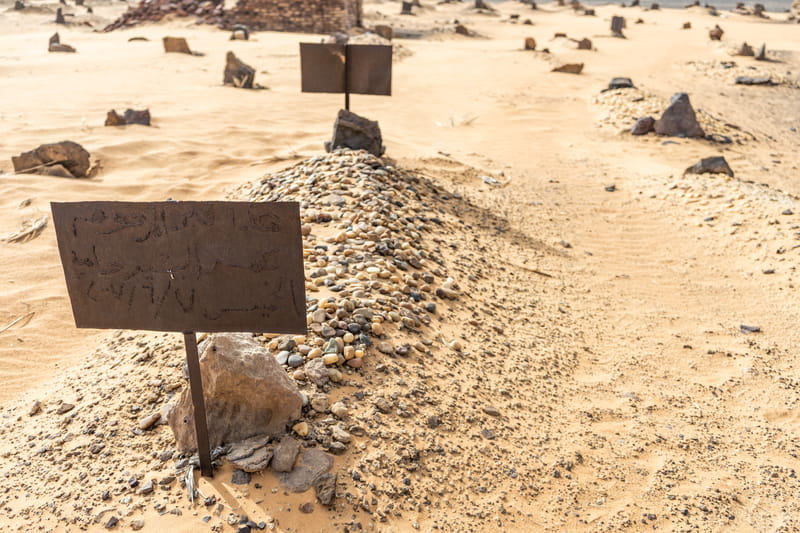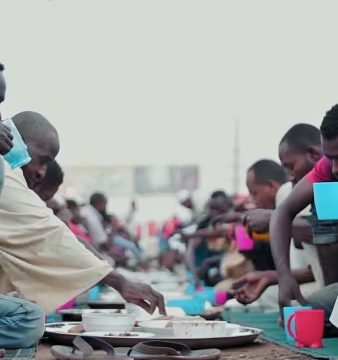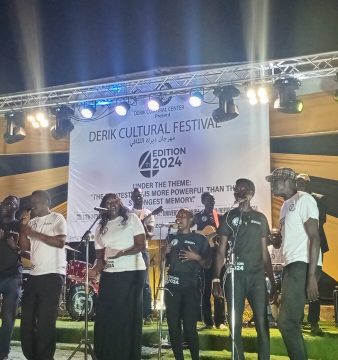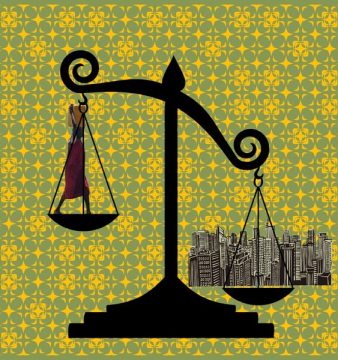All You Need to Know About Sudanese Funerals

Death is natural and a part of the lives of all living things. In Muslim countries such as Sudan, people believe that life and death are given by God.
Attending funerals or aazaa is a common in the day-to-day lives of the Sudanese people as Sudanese families are quite large, intertwined and connected, and the Sudanese people are very affable thus paying their respects when a person passes way is a very important aspect of their social life.
What happens when one dies?
As per the Islamic burial rituals, immediately after one dies, his/her family and other loved ones will conduct Ghusl (full-body ritual purification) at a mosque where they strictly following Islamic teachings as they wash and wrap the body in a simple plain cloth called kafan. The males wash the body of a deceased male, and females wash the body of a deceased female.
Then body is then transported to a mosque to proceed with the Salat Al Janazah (funeral prayer), which is typically conducted within 24 hours of the deceased’s passing. Funeral prayers are led by the Imam. The body and all attendees are all turned to face Mecca. Attendees form at least three lines: men, then children, and women in the back.
After prayers, al dafin or the burial takes place, which is when the body is buried six-foot underground, alone and by itself – without a coffin. The body is taken to the burial site in a silent procession. Traditionally, only men attend the burial. However, women and children can attend the burial. Another important Islamic burial rite is to have each person at the burial throw three handfuls of dirt into the grave.
Once this takes places, the family of the deceased and other loves ones return home to mourn their loved one. This is when the funeral service or Azza takes place.
One very important funeral rite in the Islamic faith is that burial take place as quickly as possible after death. Therefore, there is no viewing, wake or visitation. There is rarely an open casket at an Islamic funeral.
Where do I go to pay my respect and/or give my condolences?
As soon as the news of a person’s passing is heard, people head straight to the home of the deceased to be with his/her family and give their condolences. There is no specific time for the funeral nor is it custom to set a specific time for people to come and pay their respects. People are expected to come at anytime and on any day – it all depends on how close you are to the deceased and his/her family.
Under Islamic funeral customs, the mourning period typically lasts for a maximum of three days. If you wish to visit after the three days, it is acceptable. However, you are expected to visit as soon as you hear of the death. If you pay your respects at a later time, some people may be upset. Again, it all depends on how close you are to the deceased and his/her family.
Note: Funerals in Sudan are traditionally segregated. Usually, the home is designated for women and another area usually outside such as a veranda or a tent is designated for men.
What do I wear?
As with most funerals around the world, it is best to avoid wearing anything colourful or cheerful. Wear clothes that are dark in colour. Plain light colours such as white or beige are acceptable. Traditionally, women who are mourning the loss of their husbands wear a white toub.
Dress modestly, in respect of the culture. Wear something that is not revealing, see-through or tight, and that shows less skin, is long sleeved, and has a modest neckline. Traditionally, young girls and women will wear scarves and teyab (plural of toub).
Sudanese men will wear jalabiya or younger mean will wear Ala Allah or any form of casual wear.
Do I have to give the family of the deceased anything?
In Sudanese funerals, people simply give their condolences. If you are family or close to the deceased or his/her family, it is custom to contribute to the funeral expenses. This custom is called Al Kashf الكشف, which is a fundraiser and common practice in Sudanese culture where a person or people financially contribute to an event such as a funeral or more joyous occasions such as weddings.
Those who are family or close to the deceased or his/her family, may bring boxes of water, tea or coffee to help with the service and help reduce the financial cost on the family to purchase more of these products to serve to their guests.
Others contribute in service by helping to serve guests water, tea, coffee and at times, dates and help prepare meals for people at home or for the guests.
What should I say?
You begin by lifting your hands Sudanese have their own traditional phrases for funerals and commonly say the following:
If the deceased is male, say:
Al baraka feekom. Allah yerhamo wa yeghfer laho.
.البركة فيكم. الله يرحمة و يغفرلة
If the deceased is female, say:
Al baraka feekom. Allah yerhama wa yeghfer laha.
.البركة فيكم. الله يرحمها و يغفرلها
If more than one person has died:
Al baraka feekom. Allah yerhamhom wa yeghferlahom.
.البركة فيكم. الله يرحمهم و يغفرلهم.
All of the above loosely translate to:
May God’s blessings be upon you and your family. May God have mercy on [the deceased] and forgive [the deceased] for their sins.
The response to above is usually the following:
Al baraka fe al jamee. Ameen.
البركة في الجميع. امين.
Additional phrases:
Say the above and add the following:
و يجعلة/يجعلها من اهل الجنة or وأسكنه/أسكنها فسيح جناتك (May god make [the deceased] among the people of Jannah or Paradise)
واجعل قبره روضة من رياض الجنة (May God make his/her grave one of the gardens of Jannah or Paradise)
واتقبله القبول الحسن (May God accept and welcome him/her well)
Any other Islamic-based phrases are acceptable, such as the following:
عظم الله أجركم وأحسن الله عزاءكم وغفر لميتكم وأسكنه جنات النعيم (May Allah reward you, may Allah bless your consolation, forgive the deceased, and place him/her in the Gardens of Bliss)
.لا إله إلا الله، ولا حول ولا قوة إلا بالله (There is no God but Allah. There is no might and no power except by Allah)
البقاء لله (Immortality belongs only to Allah)
.انا لله وانا اليه راجعون (We belong to Allah and to Him we shall return)
What should I expect at the funeral?
People begin by raising their hands in prayer and read Surat Al Fatiha. Most women will then proceed to cry loudly and dramatically with the deceased’s family members to show their deepest and most sincere condolences for their loss. At times, after crying with them the first time, they will later return and quietly pay their respects.
You will be served with water then tea and coffee, and at times, dates. Three meals are also served per day – breakfast, lunch and dinner, mostly for those who have come from long distances to give their condolences. Most of these people are extended family members who are staying with the deceased’s family during the the funeral days.
Other important things to know:
Those who are in mourning will not attend special occasions such as weddings, birthdays and other joyous occasions especially is music is played.
In Islam, a widow is meant to mourn for her husband for four months and 10 days. That period is known as habis or iddah. She cannot leave her home and mix with society unless she has responsibilities such as going to work to provide for her family or medical emergencies.
In Islam, autopsies are strongly discouraged, since they delay burial and are considered a desecration of the body. However, it can be done to determine cause of death in suspicious or unknown causes of death. Embalming, considered yet another desecration of the body, is performed only if required by law.
Cremation is largely discouraged because of the Islamic belief in resurrection of the physical body.
Gravesites should be plain and simple, and not have tombstones as an expression of humility and equality under Islam.




